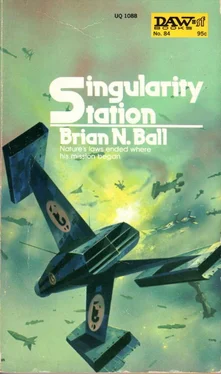Prime the weapon by placing a pinch of powder in the priming-pan. Liz wondered if her fingers were sweating too much. She wiped them free of moisture. A misfire could occur; she would have only one chance, for the process of preparing the weapon for firing had already taken over a minute. Tap the projectile into the barrel, using the ramrod. Take care not to distort the shape of the projectile.
The bullet rested on the wadding. All about her, Liz sensed the interest of robot eyes. She could have wept with fear. It was an absurd situation, ridiculous. A chance encounter with a friend of Al’s had led to this distillation of terror, to this gagging range of emotions which had previously been unknown territory. She was bitterly afraid. The determination that had kept her from leaving the ES 110 was almost entirely dissipated. She could not begin to understand why her fingers continued to prepare the barrel-loading, archaic musket, for there was no directing force behind the movement.
They were a part of a pattern of events which had encompassed her. She felt as if she, too, were a part of the robotic equipment of the prison-ship, a preprogrammed and mindless complex of nerve and tissue that was a part of the spatial and temporal framework of events beginning with the sight of Tup’s dying face, and taking in the horrors of the past few hours. The situation had grown around her. She had grown into it. There was a terrible inevitability in it.
She took the heavy weapon, careful to close the priming-pan. Tears streamed down her face as she began to walk toward the wide grav-chute. It led to the clamorous horror of the cell-deck, to the puzzled low-grade servitors, to the tanks where the expellees writhed, and to the splayed, silent body of the naive crewman she had known as Tup. And, somehow, she could negotiate the silent, eerie green-lit deck. The robots had finished their work. Many tanks were empty. The dead crewmen were gone. She knew that unseen scanners reported her presence. Twice she saw groups of low-grade servitors, but they did not attempt to hinder her.
She had known at once that Maran would not be on the deck. She grasped the musket in almost nerveless fingers, feeling the smooth stock, the heavy barrel, the delicate priming mechanism. Icy sweat covered her face and hands. Maran would be on the bridge.
“Al, I wish we hadn’t parted like that,” she whispered. When she began the quick ascent to the bridge, she could recall every line of his face. She had stormed away from him filled with a bitter rage, and she could see now the poignant hurt in his eyes. The sense of loss was almost unbearable. After the green-lit half-light of the lower deck, the bridge was startlingly bright. Liz Deffant stepped out of the chute, narrowed her eyes against the flooding light, and sought out Maran. The musket almost slipped from her hand. Two things immediately impacted on her mind: two low-grade servitors were very close to her; and Maran stood squarely before her, outlined against the bulk of the robotic controller’s pedestal. He seemed to have been waiting like that for aeons. His great body was clad in black. There was a half-smile on his face, so that Liz had the feeling that he would come toward her almost indulgently. His eyes were nearly beautiful, she thought inconsequentially, more a woman’s eyes than a man’s. His eyebrows were perfectly curved above the heavy-lashed, wide-set eyes,
Liz raised the musket and, enwrapped in her strange trance, she had a prevision of a third eye opening redly above the pair that were regarding her. The projectile was heavy, round, metallic and in a tenth of a second it would smash through the large skull and Maran would be no threat to anyone. The trigger curved in a bow against her finger.
Maran made a small gesture with his large, white hands. Liz had the impression of ponderous movement. The sights of the weapon were exactly aligned on the center of Maran’s forehead. Maran said with massive calmness: “Miss Deffant, do you really know what—” The rest was lost.
She nicked the priming-pan open, noticed in a frozen moment of time that a few grains of powder had clung to her damp fingers, and then she pulled with increasing power on the trigger. The flint snapped down.
Fire blossomed, red and yellow. Smoke gushed from the priming-pan and the barrel, and Liz was hurled backward by the recoil. She did not know whether she was glad, relieved, horrified, amazed, or empty of emotion.
The smoke cleared.
Maran had not fallen.
The clear brown eyes were not glazing in death, as the young crewman’s had. And there was no third eye. Liz knew cold, clawing fear.
She stepped back half a pace, her shoulder raw and full of pain, and then she could not step back. A black tentacle carefully detached her hands from the metal of the musket. Maran came toward her, and Liz opened her mouth in pure, blind panic.
She could hear the echoes of her scream bounding back from the cheerful pastel-colored walls. When she moved, delicate tentacles restrained her. And Maran stopped.
The half-smile had gone. There was a look of sadness on his face, that of a large man who knows that, in spite of his harmless nature, the sheer physical bulk of his body inspired fear in others. Liz held onto her sanity, gagging down her bile. She realized that he was talking to her.
“Miss Deffant,” he was saying for the second or third time. “Miss Deffant—was it you who released the survival-cylinders? Miss Deffant?”
Liz repressed a shuddering sigh. He would want his revenge. The man was a merciless, obsessed psychopath. All human emotions had died within him; he lived only for some bizarre vision. And this was the man she thought could be right about the need for investigation into the nature of the only intelligent life in the Galaxy. She wondered if he would kill her now.
“Yes!” she spat at him. “I did it—and the whole Quadrant is repeating the Red Alert! Every Enforcement Service ship in the fleet will be after you!” She almost dared him to kill her, but she could not. There was too much animal fear in her. She could not challenge him so directly, not after what he had done so easily to the guard and the young crewman. She could only wait.
“It was the bravest thing I’ve ever known,” Maran said.
Liz shuddered, awaiting a blow, the condemnation to some vile form of death, instructions to the robots to dispose of her—for anything but this. What had Maran said? That her action was the bravest thing he had ever known? He was sincere.
There could be no doubt, for his face expressed only an admiring interest. The grim mask she had first seen glaring wildly about the green-lit hell of the cell-deck had changed into this benevolent visage. Maran was looking at her with the indulgent air of a schoolmaster glad that his pupil had absorbed her lesson well.
“I tried to kill you,” she heard herself whispering.
“Yes.”
“The cruisers will take you.” Liz felt again the uncanny sense of detachment from the situation. It was almost as if the words were spoken by another woman.
“Possibly,” Maran said.
“They will!” She could challenge him now.
“Quite possibly, Miss Deffant.” He was quite calm. Liz could begin to understand the power of the man. He was massively indifferent to her attempt on his life.
Shuddering afresh, she said: “I would have killed you.”
“You thought I was some kind of monster.”
He accepted it. Tears trickled down Liz’s face and she was bitterly ashamed of herself for them; for she knew that they came with the relief of knowing that she would not be killed. Maran would not harm her. The great white hooks of hands would not reach out….
“Sit down, Miss Deffant. You are almost exhausted. If you make no sudden move toward a possible weapon, the machines will ignore you.”
Читать дальше












